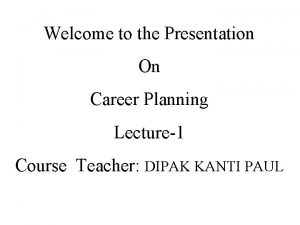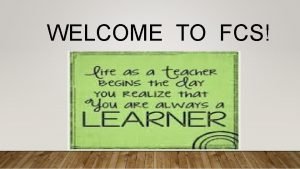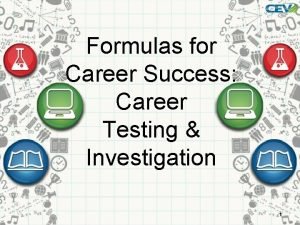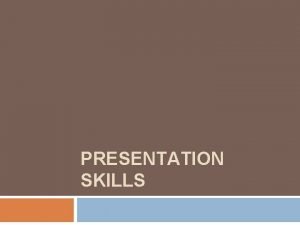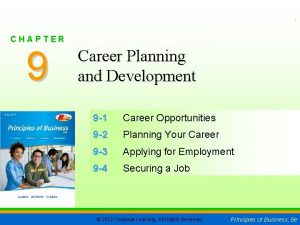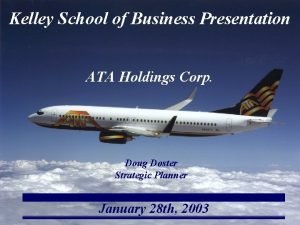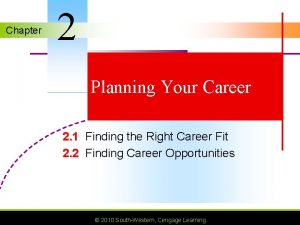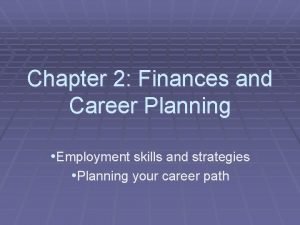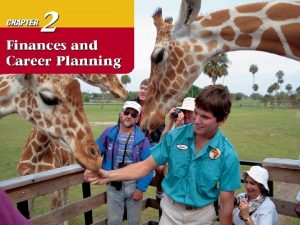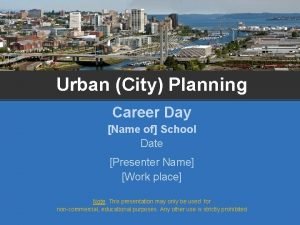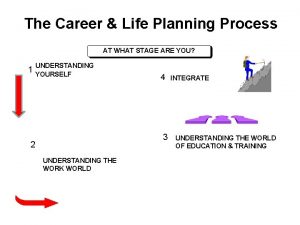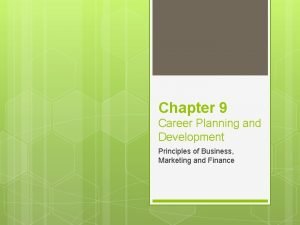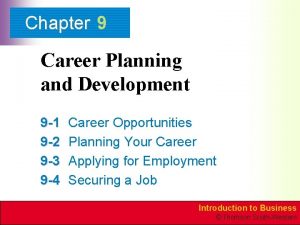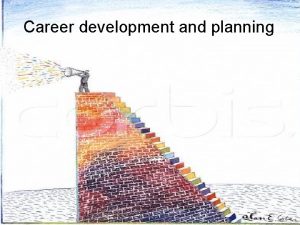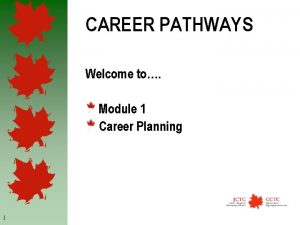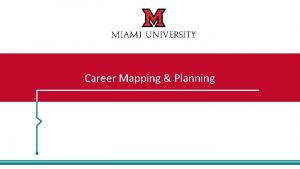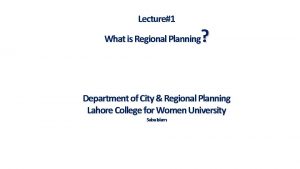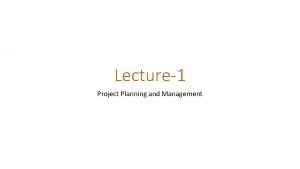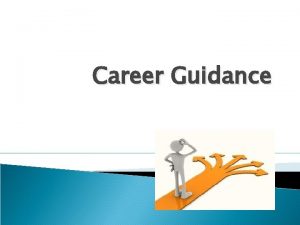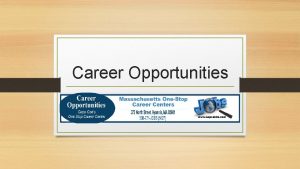Welcome to the Presentation On Career Planning Lecture1























- Slides: 23

Welcome to the Presentation On Career Planning Lecture-1 Course Teacher: DIPAK KANTI PAUL

What is Career? The term career has a number of meanings. It can be viewed from different perspectives. In popular usage it can mean advancement or upward movement to linear progression. For example, he is moving up in his career. This definition suggests that a person is pursuing a career only if he or she exhibits steady or rapid advancement in status, money and the like. People who have not experienced advancement or other substantial achievements do not really have a career.

Career means a profession (for example, he has chosen a career in medicine). It is a lifelong sequence of jobs. It is sequence of positions that a person has held over his or her life. It means stable employment within a profession. For example physicians and lawyers are thought to have careers, whereas clerks and mechanical are not. This definition suggests that one must achieve a certain occupational or social status for one’s work activities to constitute a career. Super and Hall (1988) define career as a sequence of positions occupied by a person during the course of a lifetime. A career is all the jobs that are held during one’s working life. This is the objective career. Career means advancement, professional status and stability. Arther, Hall and Lawrence consider the career to be an evolving sequence of a person’s work experience over time.

Difference between Career and Job Career is often confused with job. Experts make difference between a career and a job. According to them, a career is a perceived sequence of attitudes and behaviors associated with work-related experiences and activities over the span of the person’s life. Whereas a job is what a person does at work to bring home a paycheck, a career is being engaged in a satisfying and productive activity. Thus a career involves a long-term view of a series of jobs and work experiences.

Career Development Career development can be defined as “an ongoing process by which individuals progress through a series of stages of which is characterized by a relatively unique set of issues, themes and tasks. ” Career development involves two distinct processes. These are (1) Career planning (2) Career management Career development Career planning Career management

(1) Career Planning: (2) Career Planning involves activities performed by an individual, with the assistance of counselors and others to asses his or her skills, and abilities in order to establish a realistic career plan. (2) Career management: Career management involves taking the necessary steps to achieve that plan. It is an ongoing process of preparing implementing and monitoring career plans undertaken by the individual alone or in concern with the organizations career systems.

Career management model: Career management involves both planning for career activities and putting those plans into action. There is a model of career management that offers a perceptive approach individuals can use to manage their careers. Information opportunities and support form Next to make Decision Career Exploration Awareness of Self and Environment B Goal Setting C A Career Appraisal Feed back: Work/Network H Progress toward Goal F Strategy Implementation G E Education, Family, Work and Societal Instructions (Model of career management) Strategy Development D

Career management activities (1) Career exploration: Career exploration involves gathering information about one’s self and the environment. (2) Awareness of self and environment: Successful career exploration will lead the individual to a deeper self awareness and an understanding of both opportunities and constraints present in the environment. (3) Goal Setting: A career goal is an outcome the individual decides to try to obtain. Such goals may be specific and general. (4) Strategy development: A career strategy is an action plan for accomplishing the career goal. An effective strategy should include the actions that should be carried out and a time table.

(5) Strategy implementation: Strategy implementation involves carrying out the strategy the individual has developed. (6) Progress towards the goal: This is the extent to which the individual is nearing the career goal. (7) Feedback from work and non work sources: Valuable information about the progress toward the career goal can be obtained from both work and non work sources. (8) Career appraisal: Feedback and information on progress toward the career goal permit the individual to appraise his or her career. The successful application of this career management model depends both on the individual and the organization. It involves an exchange of information between employees, current and potential employers, co-workers, friends and also families.

What do employees want in organizational career planning? Effective career planning and development programs must consider the different perceptions and desires of employees. Employees want the following factors in organizational career planning: Career Equity: Employees want to perceive equity in the organization’s performance and promotion system with respect to career advancement. Supervisory concern: Employee want their supervisors to play an active role in career development and to provide timely performance feedback. Awareness of opportunities: Employees want knowledge of the career advancement opportunities that exist in their organizations.

Employee interest: Employees need different types of information and have different degrees of interest in career advancement depending on a variety of factors (age, gender, occupation, education). Career satisfaction: Employees, depending on their age and occupation , have different levels of career satisfaction.

Benefits of Career Planning are mentioned bellow: 1. Develops promotable employees: Career planning helps to develop internal supplies of promotable talent. 2. Lowers turnover: The increased attention and concern for individual careers generate more organizational loyalty, and therefore, lower employee turnover. 3. Improves the organization's ability to attract and retain high talent personnel. 4. Taps employee potential: Career planning encourage employees to tap more of their potential abilities because they have specific career goals. 5. Furthers growth: Career plan and goals motivate employees to grow and develop.

6. Reduces hoarding: Without career planning, it is easier for mangers to hoard key subordinates. Career planning causes employees, managers and the personnel department to become aware of employee qualifications. 7. Satisfies employee needs: With less hoarding and improved growth opportunities for employees, and individual’s esteem needs, such as recognition and accomplishment, is more readily satisfied. 8. Reduce employee frustration. 9. Assists affirmative action plans. Career planning can help members of protected groups prepare for more important jobs. This preparation can contribute to meeting affirmative action timetables.

10. It ensures needed talents will be available. 11. Improves the organization's ability to attract and retain high talent 12. Promotes organizational goodwill. 13. Facilitate International placement.

Suggestions to help a person in developing his career Making your career decision. The best career choice is one that offers the best match between what you want out of life and what you need. Good career choice outcomes should result in a series of positions that give you an opportunity to be a good performer, make you want to maintain your commitment to your career, lead to highly satisfying work and give you proper balance work and personal life. Following suggestions can be used to advance your careers. a. Select your first job judiciously. b. If you have a choice, you should select a powerful organization or department as place to start your management career. A powerful department is one in which crucial and important decisions are made. It you start out in departments that are high in power within the organization, you are more likely to advance rapidly.

b. Participate in an internship. Companies want persons who have some experiences and who show some initiative. One of the better ways of sowing these attributes is through internship. Doing internship is a prerequisite to get a degree. Internship offers you a chance to see what the work is really like, to get a better understanding of an organization’s culture and to see if you fit well into the organization. The work experience the intern gets and the realistic preview of his profession of choice are invaluable. Internship experience also enable a person to list work experience on a resume-something that recruits view very favorably. If internship is not possible, consider part-time employment in your field of choice while you pursue your education.

c. Do good work…. Good work performance is a necessary but not sufficient condition for career success. Your good work performance is no guarantee of success but without it, a successful long-term career is unlikely. d. Present the right image Develop right image. You should assess the organizations culture so that you can determine what the organization wants and values. Then you need to project that image in terms of styles of dress, organizational relationships that you do and do not cultivate, risktaking, or risk averse stance, leadership styles and attitude toward conflict. e. Learn the power structure. Know and understand the organization’s power structure. You need to learn who is really in charge, who has the goods on whom, what are the major debts and dependencies.

f. Gain control of organizational resources. Control of scarce and important organizational resources is a source of power. Knowledge and expertise are effective resources to control. They make you more valuable to the organization and therefore more likely to gain job security and advancement. Because the evaluation of your effectiveness can be very subjective, it is important that your boss and those in power in the organization be made aware of your contributions. g. Other tactics include: Being seen in social functions, Being active in your professional associations and developing powerful allies who speak positively of you.

h. Do not stay too long in your first job Moving quickly through different jobs. Seek early transfer or promotion form your first management job I. Find a mentor II. Employees who aspire to higher levels in organizations often need the assistance and advocacy of someone higher up in the organization. III. Career progression requires the favor of the dominant ingroup that sets corporate goals, priorities and standards. IV. j. Support your boss V. Your immediate future is in the hands of your current boss.

He evaluates your performance and you do not have enough power to successfully challenge your boss. You should make the effort to help your boss succeed. Be supportive. Do not undermine your boss or speak negatively of your boss to others. If your boss’s performance is poor or his power is negligible, you need to transfer to another unit. k. Stay mobile. You are likely to advance more rapidly if you indicate your willingness to move to different geographical locations and across functional lines within the organization. If possible, do not work in slow-growth and stagnant or declining organization.

l. Think Laterally If you are moving ahead in your organization, consider a lateral move internally or a lateral shift to another organization. m. Keep your skills current. Organizations need employees who can readily adapt to the demands of the rapidly changing marketplace. Focusing on skills that you currently have and continuing to learn new skills can establish your value to the organization. College graduation is not an end, it is the beginning of a continued lifelong learning journey. Remember it is your responsibility to manage your career.

n. Develop a Network Our final suggestion is based on the recognition that a network of friends, colleagues, neighbors, customers, suppliers, and so on can be a useful tool for career development.

 Career plan presentation example
Career plan presentation example 16 national career clusters framework
16 national career clusters framework Formulas for career success: résumés - assessment
Formulas for career success: résumés - assessment Wise men three clever are we
Wise men three clever are we Engineering career day presentation for elementary school
Engineering career day presentation for elementary school Objectives of presentation skills
Objectives of presentation skills Career guidance presentation
Career guidance presentation Career planning checklist
Career planning checklist Chapter 9 career planning and development
Chapter 9 career planning and development Traditional career
Traditional career Define profession in short
Define profession in short American trans air careers
American trans air careers Chapter 2 planning your career
Chapter 2 planning your career Chapter 4 finances and career planning
Chapter 4 finances and career planning Chapter 4 finances and career planning
Chapter 4 finances and career planning Personal finance unit 1
Personal finance unit 1 City planning career
City planning career Career life planning
Career life planning Chapter 9 career planning and development
Chapter 9 career planning and development Chapter 9 career planning and development
Chapter 9 career planning and development World university of bangladesh
World university of bangladesh Welcome to our presentation
Welcome to our presentation Welcome to my presentation
Welcome to my presentation Welcome slide for presentation
Welcome slide for presentation
